Objets Κέντρον Ερεύνης Ελληνικής Φιλοσοφίας
<< 10
10 >>
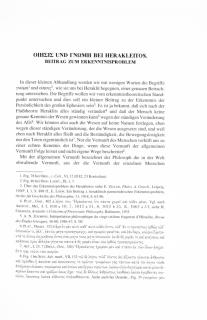
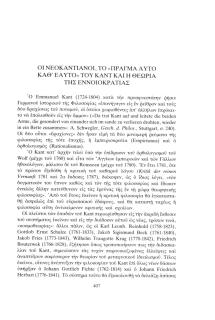
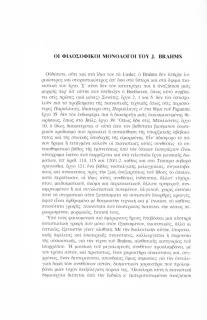
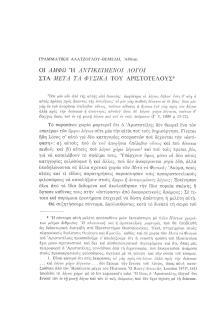
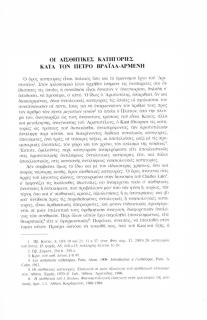
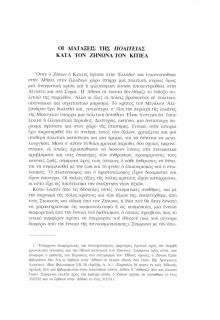
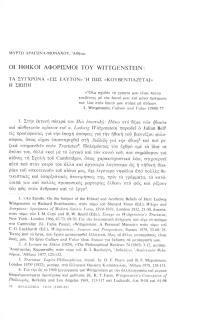
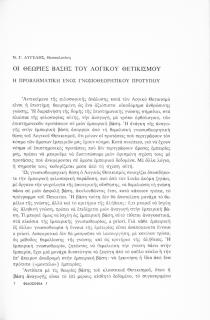
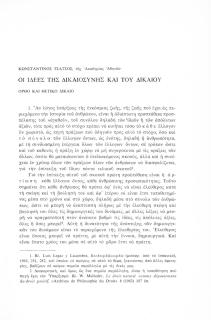
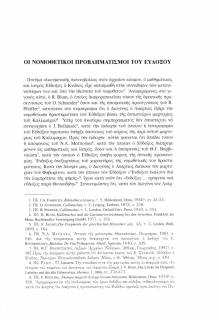
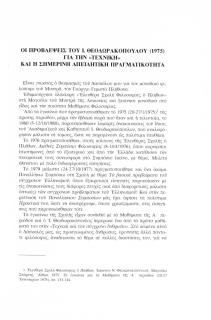
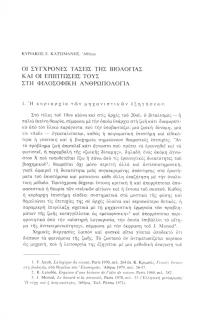 << 10
10 >>
<< 10
10 >>
Total: 4244

Οίησις und γνώμη bei Herakleitos. Beitrag zum erkenntnisproblem
Ενότητα: Άρθρα του περιοδικού "Φιλοσοφία"
Ενταύθα αναλύονται γνωσιολογικώς αι έννοιαι «οΐησις» και «γνώμη» ως έχουν παρ' Ηρακλείτω και παραθέτουν μίαν όψιν του Ηρακλείτειου γνωσιολογικού προβλήματος.
Οι Νεοκαντιανοί, το «πράγμα αυτό καθ’ εαυτό» του Kant και η θεωρία της εννοιοκρατίας
Ενότητα: Άρθρα του περιοδικού "Φιλοσοφία"
Δεν υπάρχει περιγραφή
Οι Φιλοσοφικοί Μονόλογοι του J. Brahms
Ενότητα: Άρθρα του περιοδικού "Φιλοσοφία"
Δεν υπάρχει περιγραφή
Οι άμφω ή αντικείμενοι λόγοι στα Μετά τα φυσικά του Αριστοτέλους
Ενότητα: Άρθρα του περιοδικού "Φιλοσοφία"
Wie aus der Metaphysik-Stelle 1009 a 15-21 hervorgeht sieht Aristoteles weder einen einzigen als den Erfinder der einander entgegengesetzte Aussagen noch eine einzige Ursache, welche sie alle verursacht hat. In diesem Zitat ist schon die Rede von zwei Kategorien von Philosophen, die den Widerspruch (Antiphasis) akzeptieren: erstens diejenige, die έκ του απορήσαι υπέλαβον ούτως und zweitens diejenige, die λόγου χάριν λέγουσι. Gibt es aber nur diese zwei oben genannten Kategorien oder mehrere, die nicht hier, sondern an anderen Stellen der Metaphysik angedeutet werden? Außerdem was für Gründe haben die entgegengesetzten Aussagen verursacht und welche Beobachtungen gaben den Anlaß dazu? Sind alle Philosophen aus denselben Gegebenheiten angeregt und sind sie alle den glei-chen Weg gegangen oder ist jeder durch verschiedene Wege zur Antiphasis gelangt? Hauptsächlich in Γ aber auch in Κ der Metaphysik spricht Aristoteles über die βεβαιοτάτη πασών αρχή, wie er das Prinzip des Widerspruchs nennt, und gleichzeitig widerlegt er mit vielen Argument...
Οι αισθητικές κατηγορίες κατά τον Πέτρο Βράϊλα-Αρμένη
Ενότητα: Άρθρα του περιοδικού "Φιλοσοφία"
Δεν υπάρχει περιγραφή
Οι διατάξεις της Πολιτείας κατά τον Ζήνωνα τον Κιτιέα
Ενότητα: Άρθρα του περιοδικού "Φιλοσοφία"
Zeno΄s Republic constitutes an important work in which Zeno envisions a very different society from those that existed not only in his era but also today. We can say that this work constitutes a dialogue with a mirror, where in the place of the idol is Plato΄s Republic, and Zeno may have wanted to criticize the platonic Republic, or may have wanted to supplement it with the new circumstances that resulted from historical and political changes. According to Plutarch, Zeno΄s Republic is a dream, a picture, a Utopia and a model of political life. Unfortunately, extracts from the Republic of Zeno are so few that it is not possible for us to form a complete opinion. This work constitutes a Utopian proposal that was difficult to apply, since it already sets impossible terms for the era, and does away with the individual city-states by linking them to a wider state, a kind of city-world in which (a) the education system that included three thematic cycles: letters, music and gymnastics and which constituted the basic system of education no longer...
Οι ηθικοί αφορισμοί του Wittgenstein: Τα σύγχρονα «εις εαυτόν» ή πως «κουβεντιάζεται» η σιωπή
Ενότητα: Άρθρα του περιοδικού "Φιλοσοφία"
About 1930 Julian Bell lampooned Wittgenstein for placing values beyond the world, for considering ethical statements nonsensical and still for breaking his own "vow of silence" in talking ethics and aesthetics "day and night". Russell had also remarked in his "Introduction" to the Tractatus that, although Wittgenstein placed ethics "in the mystical, inexpressible region, nevertheless, he was capable of conveying his ethical opinions". As a matter of fact, according to the Tractatian doctrine of ethical silence —subsequent to Wittgenstein΄s theory of significant language as picturing the world— ethics is unsayable and should be passed over in silence, even if ethical statements were to be taken as elucidations together with the philosophical propositions of the Tractatus. For all the advances of the Lecture on Ethics, since the doctrine of the supernatural character of ethics was still held, the transcendental idealism of the Tractatus was equally valid and ethical ex-pressions were also considered nonsensical. As it is well known, Wittge...
Οι θεωρίες βάσης του Λογικού Θετικισμού. Η προβληματική ενός γνωσιοθεωρητικού προτύπου
Ενότητα: Άρθρα του περιοδικού "Φιλοσοφία"
Die vorliegende Arbeit stellt eine Untersuchung zur Struktur und Problematik des neopositivistischen erkenntnistheoretischen Modells dar. Sie gliedert sich in zwei Teile. Der erste behandelt das Problem der empirischen Basis: hier wird der Versuch unternommen, die genaue Struktur der Beobachtugsbasis zu beschreiben und die Frage nach ihrer Zuverlässigkeit, die sie als tragfähiges Fundament für den Aufbau der Wissenschaften erscheinen läßt, zu beantworten. Die Diskussion über die Theorie der Protokollsätze, die als Reduktionsbasis konzipiert waren, weil sich aus ihnen der Bezug auf unbezweifelbare unmittelbare Faktizität erkennen läßt, führt zunächst zur Aufklärung der konventionalistischen Auflösung des logischen Positivismus. Der Konventionalismus stellt keinen Gegensatz zum Positivismus dar, sondern ist das Resultat des konsequentesten Empirismus. Diese konventionalistische Verwandlung des konsequentesten Empirismus bedeutet einerseits, daß die Erkenntnisbegründung durch Reduktion auf eine Beobachtungsbasis, die keiner Begründung bedarf...
Οι ιδέες της Δικαιοσύνης και του Δικαίου. Ορθό και θετικό Δίκαιο.
Ενότητα: Άρθρα του περιοδικού "Φιλοσοφία"
Der Verfasser geht bei seinen Überlegungen von der Idee der Gerechtigkeit aus, die er in ihrem Bezug auf die menschliche Gemeineschaft sieht. In der Gemeinschaft besteht dann Gerechtigkeit, wenn jeder nach dem ihm Zustehenden handelt, wenn sich jeder in der Position befindet, die ihm die größtmögliche kulturelle Entfaltungsmöglichkeit bietet. In diesem platonischen Sinne stellt die Gerechtigkeit, als Modus der Freiheit, das höchstrangige Sollen der sozialen Handlung dar. Um verwirklicht zu werden, bedarf dieses Sollen der Konkretisierung. Die Konkretisierung geht stufenweise vor und zwar vom ganz allgemeinen Begriff, also von der Idee bis zum Sinn, dessen Träger die konkrete Handlung ist. Es entsteht dadurch eine immer konkreter werdende Normenpyramide, die aber teleologisch strukturiert ist, d.h. dergestalt, daß der speziellere Sinn als Mittel zur Verwirklichung des allgemeinen Sinnes zu verstehen ist und das Ganze ist schließlich Mittel zur Verwirklichung der Idee. Durch Urteilskraft wird mit Hilfe der Subsumtion der tastächlichen Gege...
Οι νομοθετικοί προβληματισμοί του Εύδοξου
Ενότητα: Άρθρα του περιοδικού "Φιλοσοφία"
According to Diogenes Laertius, who drew on Hermippus, Eudoxus became famous throughout Greece for his legislation at Cnidus. In all probability, Phanocritus' lost work On Eudoxus was providing a clue regarding the purport of the Eudoxean legislation. After his return to Cnidus, Eudoxus was repaid with great honours not for drawing up his legislation but for being an illustrious professor of medicine. To our mind, the contents of Eudoxus' Laws were known solely through Aristotle' s quotations in his Constitution of the Cnidians. The use of Aristotle as the skeleton for a history of Eudoxus' legislative activity passed away gradually in Hermippus' time. As a matter of fact, it seems impossible to demonstrate that Eudoxus' legislative activity was relevant to Plato' s political views. Moreover, it is important to notice that there were no distinct differences between the Eudoxean theory of distributive justice and the Aristotelian one. On the other hand, we must dismiss the idea that Colotes was the first philosopher to find fault with Eudo...
Οι προβλέψεις του Ι. Θεοδωρακόπουλου (1975) για την «τεχνική» και η σημερινή απειλητική πραγματικότητα
Ενότητα: Άρθρα του περιοδικού "Φιλοσοφία"
Δεν υπάρχει περιγραφή

